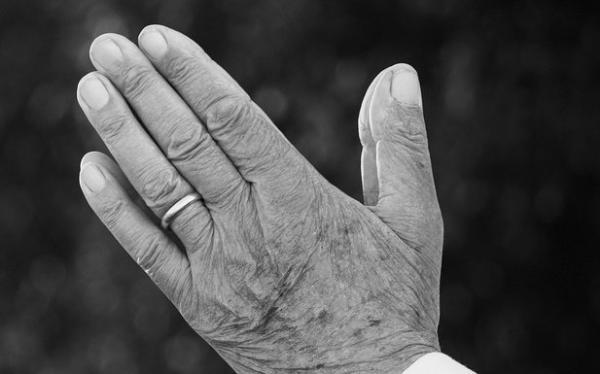Australian Jesuit, Fr Richard Leonard, is the author of the 2010 book Where the Hell is God? and the Director of the Australian Catholic Office for Film & Broadcasting. He introduces the themes in his new book by explaining what motivated him to explore the question: Why Bother Praying?
I never thought I would write a book on prayer. The Lord knows that at this stage I am no mystic. In fact, given that there are three routes to canonisation – heroic virtue, mysticism and martyrdom – I think my only chance of making it is via the latter. I share with many other Christians the usual desolations, and a lack of discipline and focus, that see my own prayer life a very humble offering to God each day.
Why Bother Praying?, however, emerged from the responses to my earlier book, Where the Hell is God? I discovered that others had very different ideas about prayer to mine. They are fully entitled to hold them – indeed they must follow their informed consciences – but the image of God behind their positions was frightening to me. It all came down to me saying that I thought we should, ‘stop praying for rain.’ For the record, I am delighted if others want to pray about the weather; I cannot do so, because if God is a big meteorologist in the sky then he seems to be very bad at it – we go from a drought to a flood in a matter of days.
In their responses, my readers outlined their reasons why they are not troubled when their prayer does not seem to be answered, or when things get demonstrably worse. Some were familiar to me:
· ‘we were praying about the wrong things, because God knows what we need rather than what we want’;
· ‘there is a much greater plan God has for all of creation and we cannot hope to see the bigger picture’;
· ‘it is only in retrospect that we can see what God was intending by what he did or failed to do’;
· ‘prayer is always answered, we just can’t see how’;
· ‘we may not like it, but sometimes God just says “no” to whatever it is we are asking’;
· ‘God’s answer to all prayers is Jesus Christ – end of story’;
· ‘God does not listen to selfish prayers.’
There were other views, held just as sincerely, that I found less than helpful; in fact, I personally reject them:
· ‘not enough people must have been praying for that intention’;
· ‘we have not prayed long enough or hard enough for God to hear us’;
· ‘we just don’t have enough faith’;
· ‘God is testing us by not answering our prayer to see how much we love him’;
· ‘God says “no” to keep us humble and so that we just rely on God’s grace every day’;
· ‘God does not listen to sinners; you have to have a pure heart for your prayers to be to be heard’;
· ‘unless you do penance as well as pray then God will not answer your prayer, because you are not serious.’
My problem is: what image of God emerges from these ideas?
In Where the Hell is God?, I came up with a short definition of intercessory prayer: ‘prayer asks an unchanging God to change us to change the world.’ Some correspondents told me, ‘this does not end up saying very much at all.’ This surprised me. In any and every important way, I do not change easily or quickly, so asking God to change me is not an insubstantial matter; it is grace building on nature. This is especially true if I want to stay changed.
All this got me thinking more broadly about prayer – what it actually is, in all its styles and forms, and how we might answer the often-heard question, ‘why do you bother praying?’
I came to eight conclusions in Why Bother Praying?:
1. One of the reasons some of us give up on prayer is because we may not have been introduced to its riches. Prayer is making space for God to love us, for us to hear that and then, through the community of faith, to have the courage to return the compliment. It changes lives.
2. The best of prayer engages our vivid imaginations and a vast array of biblical images to develop a set of ideas that reflect various personal theologies that will suit every season under the sun. One size does not fit all. This enables us to enter more deeply into a relationship with God who accompanies us through the events of our lives.
3. We pray because prayer is not just about asking for something for someone, somewhere. Intercessory prayer is important given that it asks an unchanging God to change us to change the world, but prayer helps to see that the Psalms are in fact a workshop showing us how to explore other deeply human responses to the divine: praising and giving thanks; crying out in lamentation; affirming our trust and faith; singing of our salvation; and simply waiting upon the Lord.
4. Building on the Scriptures, our Christian heritage has given us a supermarket of ideas, styles, insights, challenges and ways and means to God. For many people, the schools of prayer provide a history, framework, discipline, meaning and structure to their communication with God and one another. It connects them to something that has stood the test of time and helped millions of people not just to have deeper prayer lives, but to transform their community for the better by how they have lived.
5. No matter what image, response or school of prayer we find helpful, Christian prayer is centred on a person, Jesus. Through him we are invited into a loving and saving relationship with the Father, Son and Spirit, that has consequences for how we live in this world and the next. In this relationship, nothing is wasted in our often complex lives. We are invited to grow from where we are, and to realise our full potential. Prayer helps face down fear, and live in hope. And when we feel distant from Jesus, guess who has moved away from whom? Our prayer is not about appeasing an angry God. There is nothing that can ever, or will ever, stop God from loving us.
6. Because Christian faith is personal but never private, then public prayer matters because I am not just saved as an individual, but we are saved as the People of God. We need each other to rise to that invitation as we come together to pray in an assembly that stands before mystery in awe and wonder, is hospitable and expresses ancient faith in a contemporary world. In the sacraments, God’s greatness meets our frailty.
7. Mary and the saints show us how it is done and always lead us to Christ. And most of us need all the help we can get; we need role models who have said yes as they made their own pilgrimage of faith and hung in there when the going got tough, especially when they touched their own personal, spiritual and sometimes material poverty.
8. Prayer comes at a price. We do not pray simply to effect our salvation in heaven. We pray to keep on mission with Christ in the world. Our lives may be the only Bible some people will ever read. Our living of the virtues and our commitment to justice and peace may be the only sacraments some people ever witness and celebrate. They might decide whether to bother praying on the basis of what they hear but even more on what they see. Our prayer is not judged on how we feel, but on how we live and what we say away from prayer. Though we all fail, prayerful people are traced with Christ’s life as a result of the encounter with him and so are compassionate, hopeful, joyful, grateful, forgiving and loving. The Church and the world need prayerful people more than ever before.
In Why Bother Praying? I have also included a few gems of wisdom that have helped me to persevere.
My Jesuit Novice Master was Fr Des Dwyer SJ. He is a very wise and compassionate man. Like me, and I think rather unusually for novice directors, he was an extrovert. He understood what I meant when I said that I was sure that most of the Church’s traditions and prayer practices seemed to be ‘the revenge of introverts.’ Sensing that it can be easy to give up or cut corners when the way seems unnatural and too hard for little benefit, my Novice Master used to say regularly: ‘each day, some prayer, any prayer, is better than no prayer’. As unrealistic as it is for most of us, the bad spirit convinces us that we should have a powerful and sustaining prayer-life all the time. The perfect is the enemy of the good. Rather than give up on prayer, the good spirit encourages us to do what we can, from where we can, as we can. Some prayer is better than no prayer.
The second piece of wisdom comes from the most important book on prayer I have not read. The reason I have never read the book is that I never got past its title and the preface. Fr Frank Wallace was an Australian Jesuit who in 1991 published a book on prayer entitled Encounter, Not Performance. It changed my prayer-life. Frank Wallace was dutiful for many years to Mass, meditation, the Liturgy of the Hours, the rosary and the Ignatian Examen. However, it was not until he had powerful experiences of his faith through the Cursillo and Marriage Encounter movements that he came to see that prayer was not about doing things to keep God happy - performing - but about creating a space within which we can encounter the love of God. Frank would concede readily that this encounter can happen in the spiritual duties he did so faithfully all his life, but he also saw that these daily rituals do not necessarily lead to a deepening of the primary relationship to which they pointed.
Whatever we call prayer, it is in every case an encounter with God. Prayer is a means to an end, not an end in itself. The end we seek in prayer is to encounter the presence of a loving God. Once we stop acting for God, putting on a show, and really seek God’s presence in prayer then all sorts of possibilities open up. Prayer also provides the place wherein God can find us. God’s creativity and desire for our good knows no bounds.
The third piece of advice is a direct re-working of one of St Ignatius’s rules: if it helps, do it; if doesn’t, don’t. Neither Ignatius nor I think that praying over the Bible and celebrating the Sacraments, especially the Eucharist, are optional extras for Catholics. Apart from these being the oldest ways of Christians praying, they bring God’s presence to us in concrete terms, here and now. My concern is that some people, in their enthusiasm for a particular style, way or school of prayer, can insist that their way is the onlyway for everyone: ‘If you want to be a good Catholic, then this is what you have to do’. Well you don’t. It is an example of what Patrick O’Sullivan SJ calls the ‘hardening of the oughteries’: we ought to be this, we must do that. Even if some venerable practices nurtured saints and martyrs, and we may be foolish to ignore their obvious benefits, there are in fact many ways in and out of God. If what we are doing is good in itself, and is bearing spiritual fruit in our lives, do it; if it isn’t, don’t.
The fourth and final piece of advice I live and pray by came during my tertianship, the third phase of Jesuit formation. I was very blessed to have the great spiritual director and writer Fr Bill Barry SJ, who has authored many classics on prayer and spirituality, as my tertian director. He tells a story from his time as Provincial Superior of the New England Jesuits. Just before he was to leave for Rome for a very important international Jesuit meeting, he had trouble swallowing. The doctor found a growth on his vocal chords. He made the decision to have the radiation right away. The next summer, he made his retreat. He went into it having had a very difficult meeting in his role as provincial. His cancer, as well as this meeting, weighed on him. His spiritual director suggested he pray upon Isaiah 42: ‘I, the Lord, have called you, made you safe, so that you will open the eyes of the blind and set prisoners free.’
He spent the whole retreat on it and at one stage heard through this text, ‘You’re wanted, not needed.’ One evening while he was outside walking, he realised, ‘I could be dead now.’ And in the mood of the retreat, he burst out laughing with the thought, ‘And someone else would be provincial and the province would go on quite well without me.’
Sometimes we are so frantic being needed we drive ourselves into an early grave. If we die, the world will go on – maybe the lesser and worse for us not being there, but on it will go on. The best prayer enables us to keep ourselves in check. We are not needed by those we love and serve. We hope that they want us, and they want us in the best shape possible for a very long time. A very good outcome of prayer is self-preservation. God does not need us, either; God wants us.
While there are some very wise and venerable guidelines, there is only one absolute rule: is what I am doing enabling me to love God, love my neighbour and love myself? Love of self has had a mixed history in the Christian story, but it is essential for prayer and mission, and not just because Jesus said it. Self-love is often confused with self-adoration, but nothing could be further from what Jesus is saying. If we have no sense of our own self-worth, our own dignity and the personal love God has for each of us, it is impossible for us to give the same to others and to claim from others the dignity we deserve. We will either treat others as our inferiors, or allow others to walk all over us. Love of self is not about canonising a loss of self-control. Jesus shows us by the way he loved his Father, us and himself that true love always involves sacrifice. If we love our self in the right way, we have the self-control to forego those things that are most destructive in our lives, and we have the generosity to do for others the things that will enrich their lives. Jesus knew that we can never love others if we hate ourselves. So before we pray we better sort out who and what we love.
Throughout Why Bother Praying?, I explore all of these themes with a host of examples and many stories, funny and sad; and I hope, with a light touch.
Richard Leonard SJ is a visiting professor at the Pontifical Gregorian University, Rome, and directs the Australian Catholic Office for Film & Broadcasting. Why Bother Praying? and Where the Hell is God? are distributed in the UK and Ireland by Columba Press www.columba.ie.
![]() Thinking Faith’s review of Why Bother Praying?
Thinking Faith’s review of Why Bother Praying?![]() ‘Where the Hell is God?’ by Richard Leonard SJ on Thinking Faith
‘Where the Hell is God?’ by Richard Leonard SJ on Thinking Faith






